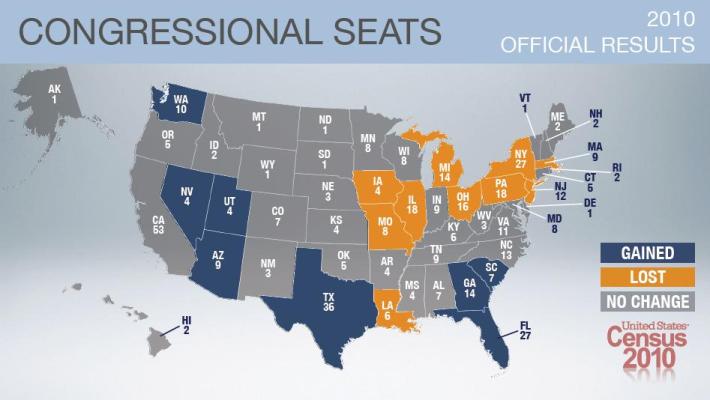The U.S. resident population has grown 9.7 percent over the last decade. There are now 308,745,538 of us here, according to brand-new numbers from the 2010 census. The states with the country's dominant metropolitan areas aren't growing nearly as fast as less dense states. And Congressional representation will follow suit.
The state of Nevada had the greatest rate of growth, at 35 percent. Only Michigan and Puerto Rico declined.
My own, entirely urban, non-state of the District of Columbia posted a population gain for the first time since 1950. It's no surprise to longtime residents: you can see it in the gentrification of our neighborhoods. But it’s a positive sign that the fear of race riots and crack is no longer keeping people out of the urban center. DDOT Director Gabe Klein tweets, “Don't discount the effect of transportation!” We still have a ways to go: there are still only about 600,000 D.C. residents, as opposed to 800,000 in 1950.
The most telling numbers are the regional growth stats. The Northeast and Midwest aren’t exactly shrinking – they each gained between 3 and 4 percent – but in comparison with the rest of the country, they are. The South and West each have about 14 percent more people than 10 years ago.
Census numbers dictate Congressional representation. Since the total number of representatives stays the same at 435, it’s the distribution that changes.
States gaining seats are Arizona (+1), Florida (+2), Georgia (+1), Nevada (+1), South Carolina (+1), Texas (+4), Utah (+1), and Washington (+1). Of those eight, five voted Republican in the last presidential election, and seven voted Republican in the two elections before that. Washington is the only reliably blue state gaining seats.
The losing states are Illinois (-1), Iowa (-1), Louisiana (-1), Massachusetts (-1), Michigan (-1), Missouri (-1), New Jersey (-1), New York (-2), Ohio (-2), and Pennsylvania (-1). Of those 10 states, six are solid Democratic and two are solid Republican, and two swing both ways.
This reapportionment also signals the diminishing power of some traditional urban powerhouses. With the rise of the South and the West, we see more people in spread-out cities, as opposed to the tighter urban plans of the industrial Northeast. Some cities in these rapidly growing states are working on building up their transit infrastructure – Phoenix and Fort Worth stand out as just two examples.
With the Republican windfall this November, sustainable transportation and smart growth advocates have already begun turning their rhetoric to the right, trying to relate to a more conservative, less urban mindset. These census numbers indicate that those arguments may serve us well for years to come.






